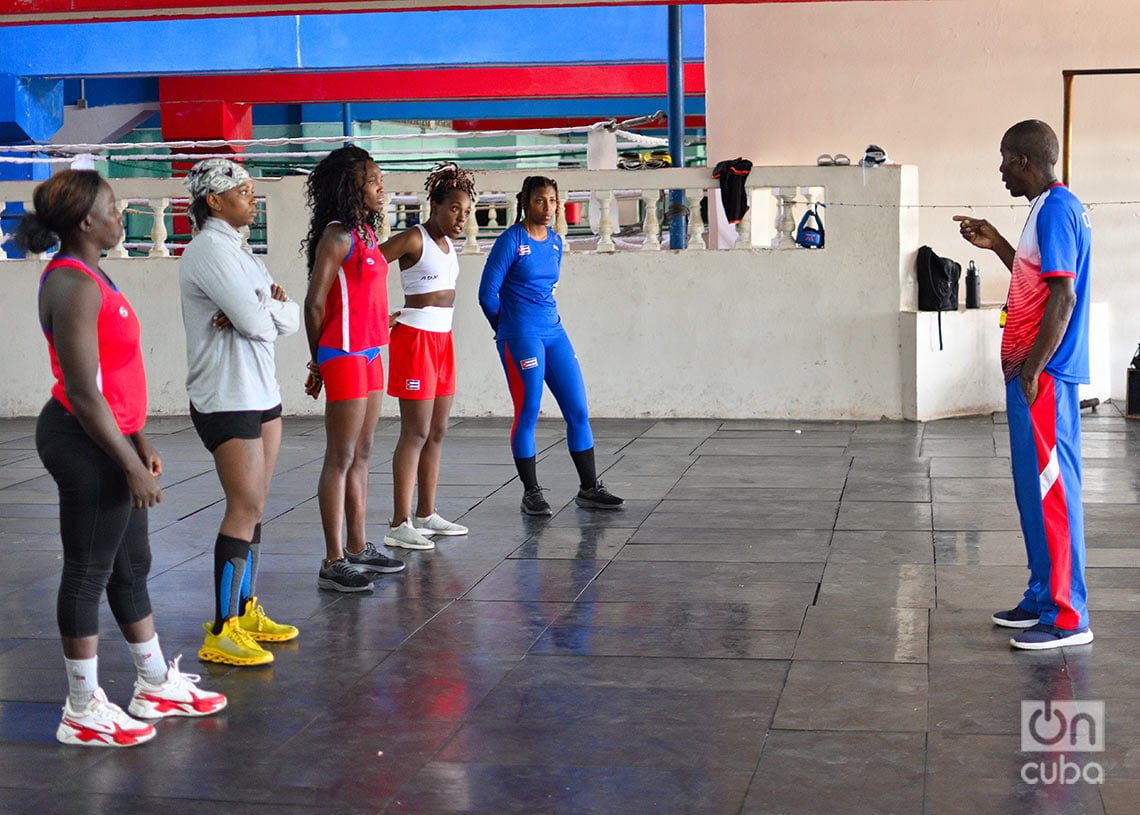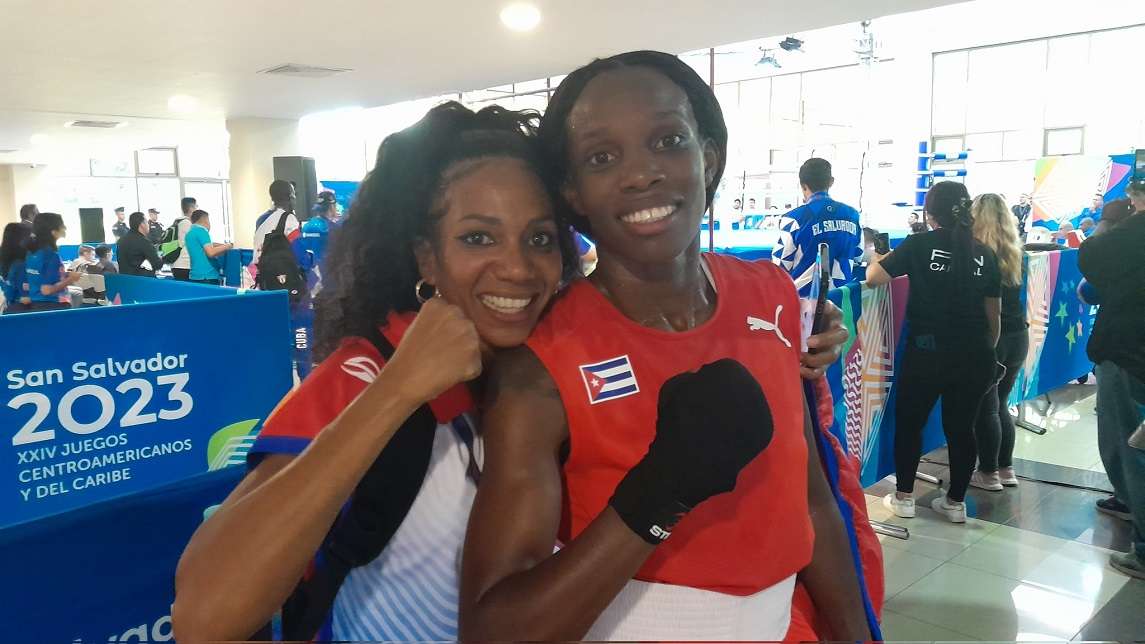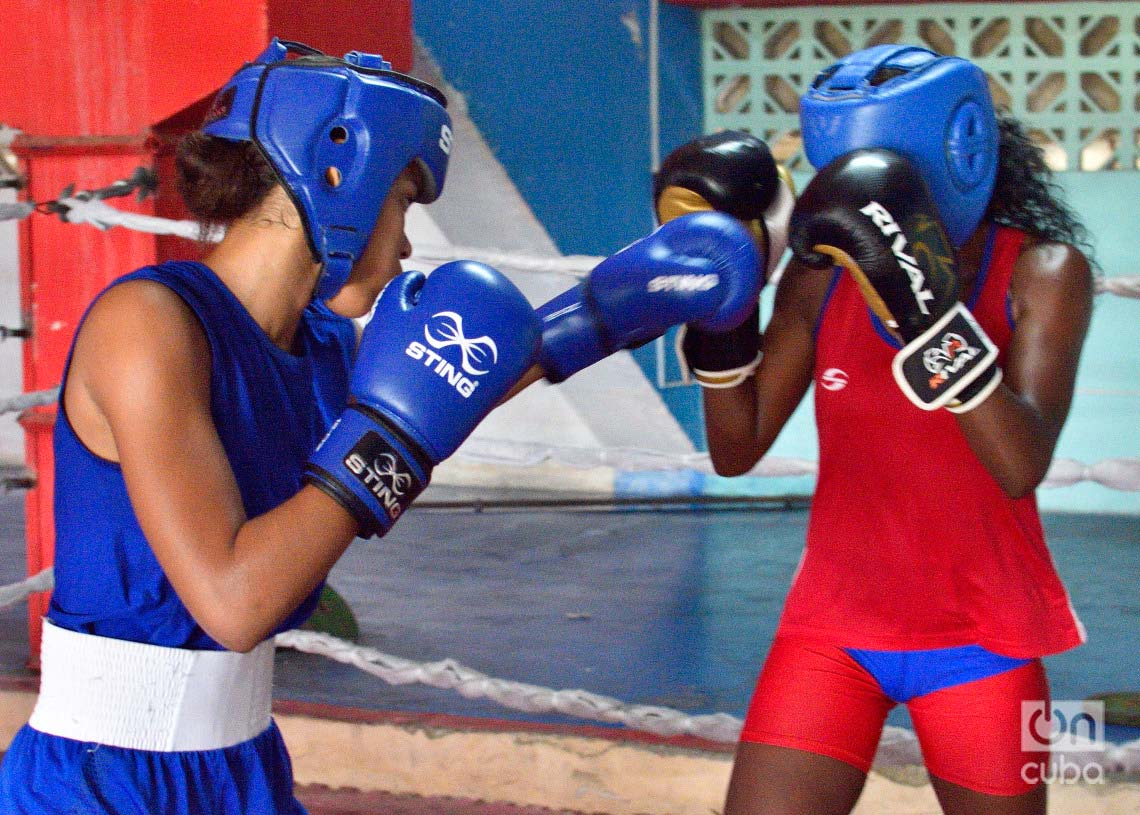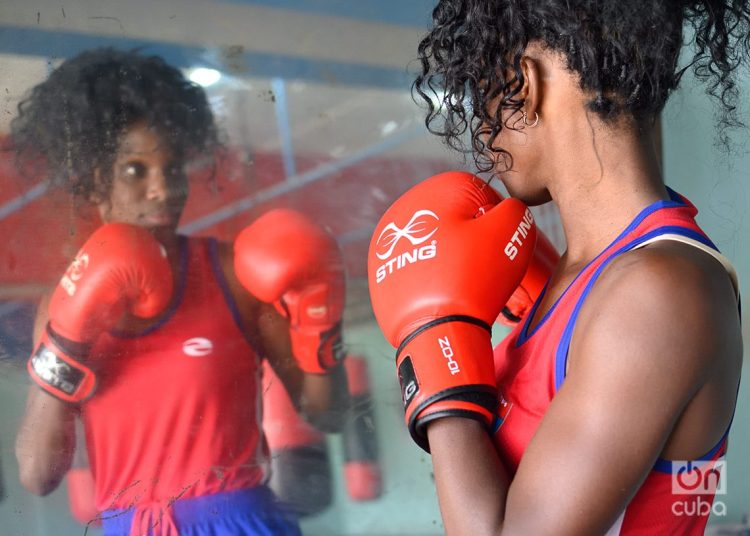Boxing changed Legnis Cala Massó’s life from one day to the next. At 32, she had long ago left behind the dream of succeeding in sports. But, unexpectedly, she got a second chance.
“I had tried to hang up my gloves, but I couldn’t. Life put boxing in my path,” says this young woman from Havana. Just a year ago she could not imagine that she would be the Central American runner-up in the 57 kilograms and that today she would emerge as one of Cuba’s hopes for the Pan American Games in Santiago, Chile, which will begin in just a few days.
When last December the island’s sports authorities announced the oft-delayed officialization of women’s boxing, Legnis was no longer thinking about getting into a ring. She was “sitting at home,” she tells OnCuba, wondering how to get her life back on track after the impasse of the pandemic.
Until COVID-19 disrupted the plans and routines of millions of people, she, at least, took a walk to the gym “from time to time.” Her idea was not to become a boxer per se, but to stay in shape and enjoy “the adrenaline” that she feels when she gets into the ring.
But with the pandemic all that was left behind. Afterward, nothing was the same. This is why she resisted the idea of attending the meeting held by the Cuban Federation in search of athletes for the nascent women’s national team. “I didn’t want to go. At that point, what for?” she says.
“The blame” for her changing her mind was that of a neighbor, who also practiced boxing and insisted that she accompany her to the competition. And she also blamed her weakness in allowing herself to “get excited,” when she herself did not believe that it would make much sense for her to put the gloves back on.
“That same day of the competition I had a family affair, but I was already there, and I got into the ring. I lost the fight and I thought that was it, that I had no chance, but it seems that the coaches saw something in me, because they still selected me for the team. They had confidence in me when I myself didn’t think I could, and here I am,” she notes.
Discovering the ring
Legnis Cala got to boxing by chance. The left-hander from Arroyo Naranjo wanted to be an athletics star and in 2007 she entered the National ESPA in this sport. Her thing, she tells me, was high jump, but then, because of “life’s ways,” she would not follow that path.
She left the school, stopped training, had a baby when she was only 19 years old. Her dream of high performance became too distant. A few years later she found boxing.
“After giving birth I stayed at home and started to gain weight. So, after a while, I started doing exercises again to lose weight and get in shape, and I came across boxing,” she says.
“I saw some girls who were practicing it at school (Giraldo Córdova Cardín High-Performance Athletes Training School), it made me curious and I went in,” she adds. “I saw what it was like, I started practicing, and soon a girl came who had experience as a boxer and had won I don’t remember what, and I sparred with her.”

“I had only been training for two weeks, and I liked that feeling. I felt a little nervous, but I liked the adrenaline you feel in a fight, and that’s when I got excited and stayed a while longer,” she tells me during a break from her training in the gym at the Pan American Stadium, east of Havana.
At that time, about seven years ago, Legnis was almost 25, she was raising her daughter and had started working. He took up boxing as a hobby. But women’s boxing was still far from being an official sport on the island and with the change of practices to Old Havana, and for other personal reasons, Legnis stopped regularly practicing.
“When I started training I did it for about three months straight, but then I would go once in a while, disappear, come back, and so on. And then the pandemic came and I didn’t return until now, and that’s because I let myself get excited about returning. But I don’t regret it, because, although it has been very hard, it has been worth it,” she says.
Women’s boxing in Cuba: a fight against time and misunderstanding
A radical change
For the current Central American silver medalist, leaving what was her life until last December and undergoing the rigors of intensive training, even away from her daughter and her family, has been a radical change.
“After I left athletics and had my daughter, I lived a very different life from the present one,” she confirms. “I was the secretary of a children’s daycare center, I was working in security at the Casa de la Música, and something else, and although I trained boxing from time to time, it did not cross my mind to return to top-level sports. When this opportunity came I was at home, without working, and it has been a tremendous change in my life, honestly.”
How have you accepted this change? How difficult has it been for you to adapt?
It hasn’t been easy. I’ve had my little problems, but they are things that are fixed over time. The fact of changing from one type of life to another, like this, has been favorable in many ways, but it has also had an impact, not only on me but also on my family: on my daughter, on my mother, on my couple. But here I am.
The training is very strong and very demanding, and I give it all in the gym, I don’t hold back. That’s why I end up dead tired, as we Cubans say, and that’s why I stay here at school, to recover for the next day. I have to do it this way, because if I go home I feel too tired to come the next day, and also being so close to the family pulls you in, makes you want to stay there with them.

After all these months, the truth is that I feel the changes. My body has changed a lot, I even notice it in the way I walk. I have more endurance, although I also feel very exhausted after these strong sessions. Of course, that changes when the loads begin to decrease, following the planning of teacher Santiago (Suárez) and the other coaches. Then I feel much better, and I see the result of the work.
And how do things work with the family?
I go home on weekends, although I try to always pay attention to them. I am quite family-oriented, I like to be at home, with my daughter, watching TV, and not being able to do that every day is hard. But I have to do it this way to be able to continue in boxing and achieve the results I want, which are also my family’s.
At home, they help me a lot so that I can be here, especially with respect to my daughter, who is now 11 years old and who worries me the most. They support me a lot in that; my mother is with her all the time and that has been very important to be able to move forward. It has been a great help to be able to stay calm and focused.
Aspirations, prejudices and advice
Although just a year ago she didn’t even think about getting into a ring again, much less attending an international event representing Cuba, boxing has awakened Legnis Cala’s competitive gene and desire to succeed.
“I am focused on the competitions, on the results,” confirms the left-handed woman, who recently completed a training base in France ― including a competition ― and who also entered history as the first Cuban woman boxer to officially fight in an international competition. This happened during the ALBA Games, in Venezuela, a competitive prelude to her — for many surprising — second place in San Salvador.
“We went to the Central American Games with a bronze prediction and after winning silver I feel I am more demanding, more responsible. Now I demand more from myself, I no longer only think about participating and seeing the result, but also about achieving a good one. I’m still starting out and the biggest challenges are ahead, but if I want to go far I have to think big: about winning, about getting medals,” she says.
So your aspirations have evolved.…
Well yes. At first, to be honest, I didn’t even think about the medals. My idea was to participate, learn, and attend competitions representing Cuba, but I never thought I would obtain the results I already have in such a short time.
Right now that is no longer the case. And I don’t have a single goal, because I always want more. If I get something, like the medal at the Central American Games, then I want the medal at the Pan American Games. It’s difficult, but we are training for it. And next year there is the World Cup, there are the Olympic Games, there is still some time left, and we have to see if we will be able to go, but I do want to be there and see what happens. I’m going forward because my thing is to continue.

Women’s boxing is not well regarded by all people in Cuba. What do you think about that prejudice? What is your experience in this regard?
I have not suffered any prejudice regarding the subject of women’s boxing, really. On the contrary, many people, when they know that I practice boxing, encourage me, ask me if I was the one who won a medal, and they are happy, and they have even told me that my boyfriend has to watch out because if he doesn’t, you know… But those are jokes, and no one has said anything nasty to me because of boxing, although I know some people don’t understand that we women are in this sport.
I am a boxer in the gym, in competitions, but out of the gym, I am like any other Cuban woman. I am as feminine as anyone, even though my body has changed due to training, and I lead my normal life, with my daughter, with my family. Women boxers are women like all the others.
To those who look negatively at women’s boxing, I understand that it is their opinion, but it seems to me that they should be better informed, documented and leave prejudices behind. We have breast, ovary, mouth, and head protectors. We are protected all around.
That women box is already something normal in the world, and even more so with all those protections. Why can’t we do it in Cuba? What can happen, that they knock me out? Well, nothing happens, it’s part of the sport.

What advice would you give to girls and women who are interested in boxing?
I advise girls who like it and want to get into boxing not to be afraid, that it’s possible. Boxing has its demands, but if you work hard you can achieve it, even if you didn’t believe it at first, like I did. It is true that they can get nervous, that there may be fear, but all that goes away inside the ring.
When you get into the ring and throw your first one-two, even if it’s in the air, everything else is erased, the fear goes away and you focus on winning the fight. You may not make it, but if you try, at some point you will, even sooner than you think.
I hope that the number of women boxers in Cuba continues to increase, that there are more girls who are interested and go to the EIDE and that they can join the national team here as well. Just like we are doing, they can show that Cuban women can succeed in boxing; that they go to more international competitions and that they can make Cuba’s name in women’s boxing shine.










